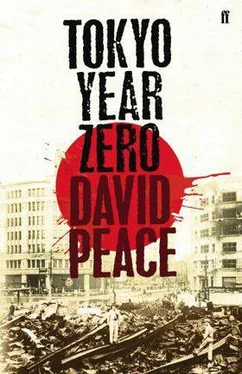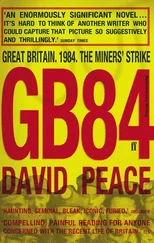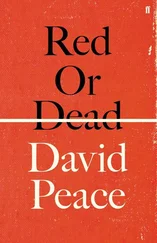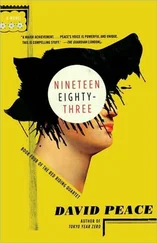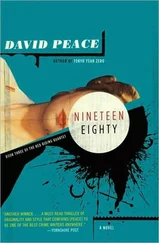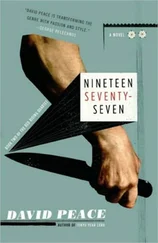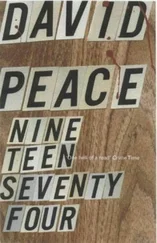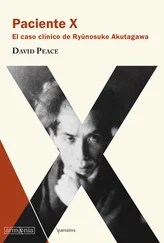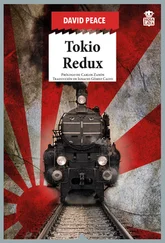To eat. To work. To eat. To work …
There is only this now.
*
I have waited hours to lie again here upon the old tatami mats of her dim and lamp-lit room. I think about her all the time . I have waited hours to stare again at her peeling screens with their ivy-leaf designs. I think about her all the time . I have waited hours to watch her draw her figures with their fox-faces upon these screens –
I think about her all the time …
Yuki is the one splash of colour among the dust, her hair held up by a comb. Now Yuki puts down her pencils and stares into the three-panelled vanity mirror and says, ‘Oh, I wish it would rain…
‘Rain but not thunder,’ she says. ‘I hate the thunder…
‘The thunder and the bombs…’
She haunts me …
‘Rain like it used to rain,’ she whispers. ‘Rain like before. Rain hard like the rain when it fell on the oiled hood of the rickshaw, drumming louder and faster on the hood, the total darkness within the hood heavy with the smell of the oil and of my mother’s hair, of my mother’s make-up and of her clothes, the faces and the voices of the actors we had seen on the stage that day, in those forbidden plays of loyalty and of duty, those plays of chastity and of fidelity, of murder and of suicide, those faces and those voices that would swim up through the darkness of the hood towards me…’
She has haunted me from the day I first met her, in the thunder and the rain, from that day to this day, through the bombs and the fires, from that day to this …
Yuki is lying naked on the futon. Air raid! Air raid! Here comes an air raid! Her head slightly to the right. Red! Red! Incendiary bomb! Her right arm outstretched. Run! Run! Get a mattress and sand! Her left arm at her side. Air raid! Air raid! Here comes an air raid! Her legs parted, raised and bent at the knee. Black! Black! Here come the bombs! My come drying on her stomach and on her ribs. Cover your ears! Close your eyes!
‘Make it rain again,’ she says –
And then she brings her left hand up to her stomach. I think about her all the time . She dips her fingers in my come. I think about her all the time . She puts her fingers to her lips. I think about her all the time . She licks my come from her fingers and says again, ‘Please make it rain, rain like it rained on the night we first met…’
She haunts me here. She haunts me now …
I place an egg and two hundred yen on her vanity box and I say, ‘I might not be able to visit you tomorrow.’
Here and now, she haunts me …
‘I am a woman,’ she whispers. ‘I am made of tears.’
*
The Shinagawa station is in chaos. Every station . There are queues but no tickets. Every train . I push my way to the front and I show my police notebook at the gate. Every station . I shove my way onto a train. Every train . I stand, crushed among people and their goods –
Every station. Every train. Every station. Every train …
This train doesn’t move. It stands and it sweats –
Finally, after thirty minutes, the train starts to move slowly down the track towards Shinjuku station –
Every station. Every train …
I force my way off the train at Shinjuku. I fight my way along the platform and down one set of stairs and then up another. I have the two eggs in one hand, my notebook out in my other –
‘Police. Police,’ I shout. ‘Police. Police.’
People hide their eyes and people clutch their backpacks. People stand aside as I heave my way onto the Mitaka train. I stand crushed again among more people and more goods –
This is how we live, with our houses lost …
I jostle my way off the train. I go through the ticket gate at Mitaka. I put the eggs in my jacket pocket. I take off my hat. I wipe my face. I wipe my neck. I am parched –
Itching and scratching again –
Gari-gari. Gari-gari …
I follow crooked, impotent telegraph poles down the road to my usual restaurant, half-way between the station and my home –
The one lantern amidst the darkness where once there had been ten, twenty or thirty others, illuminating the street, advertising their pleasures and their wares. But there is no illumination –
No wares or pleasures to be had here now.
I step inside. I sit down at the counter.
‘A man was here looking for you last night,’ says the master. ‘Asking questions about you. After your new address…’
No one who they say they are. In the half-light …
I shrug my shoulders. I order some sake –
‘No sake left,’ says the master. ‘Whisky?’
I shrug my shoulders again. ‘Please.’
The master puts the glass of whisky on the counter before me; it is cloudy. I hold it up to the light bulb –
I swirl the mixture around –
‘If you don’t want to drink it,’ says the master. ‘Then go.’
I shake my head. I put the glass to my lips. I knock it back –
It burns my throat. I cough. I tell him, ‘And another!’
I drain glass after glass as the old men at the counter joke with the master, horrible jokes, terrible jokes, but everyone smiles, everyone laughs. Ha, ha, ha, ha! He, he, he, he!
Then one old man begins to sing, softly at first, then louder and louder, over and over –
‘Red apple to my lips, blue sky silently watching …’
*
In the half-light, my wife sits sewing at the low table, my children asleep under the mosquito net, and suddenly I feel too drunk, too drunk to stand, to stand and face her with tears in my eyes –
The two eggs broken in my pocket –
But she says, ‘Welcome home.’
Home to where the mats are rotting. Home to where the doors are in shreds. Home to where the walls are falling in –
Home. Home. Home. Home. Home. Home …
I sit down in the genkan with my back to her. I struggle with my boots and then ask, ‘How are the children?’
‘Masaki’s eyes are much better.’
‘How about Sonoko?’
‘They are still inflamed and swollen.’
‘Haven’t you taken her back to the doctor?’
‘They washed them out at the school yesterday but the nurse told her to stay at home until they have cleared up. They are worried it will spread to the rest of the class…’
Now I turn to face her and ask, ‘So what did you do today?’
‘We queued at the post office most of the morning…’
‘And did you get the money? Did they give it to you?’
‘They told us to come back tomorrow. So then we went to the park in Inokashira but their eyes hurt and they were hungry and it was so hot that we came back here before lunchtime…’
‘Have you eaten anything today?’
‘Yes.’
‘What?’
‘Some bean-paste buns.’
‘Fresh?’
‘Yes.’
‘How many?’
‘One each.’
‘One each for the children and one for you?’
‘I wasn’t hungry.’
‘Liar!’ I shout. ‘Why do you lie?’
My wife stops darning the children’s clothes. She puts away her needle and thread. She closes her sewing box. She bows slightly and says quietly, ‘I am very sorry. I will try harder.’
Now I stand up. I walk across the mats –
These rotting mats …
‘There was a murder today, maybe two murders,’ I tell her. ‘My room has pulled the case and so you know this means I’ll be away for the next twenty days or…’
My wife bows again. My wife says, ‘I know. I understand.’
I take the three hundred yen from my pocket. I put it on the table and I say, ‘Take this.’
Читать дальше
